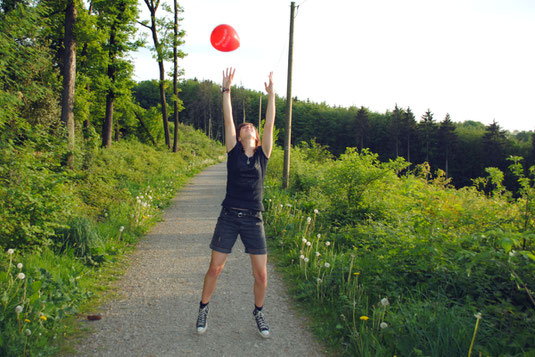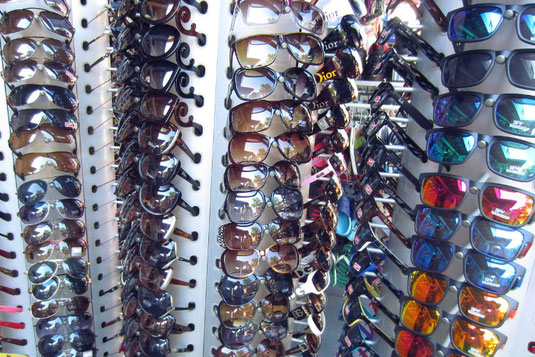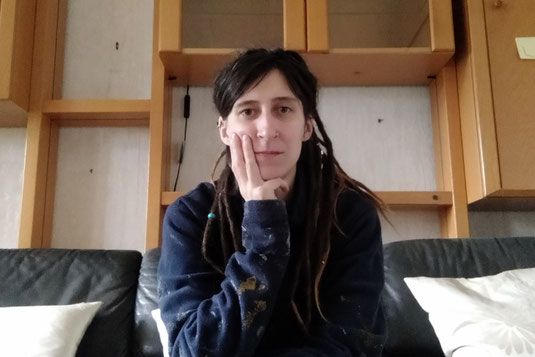I don't need this! Why less is more.
25. Mai 2024

I'm standing at the airport when a rolling wall looms towards me like a sandstorm in the Sahara. I push my backpack aside with my foot, sip from my water bottle and close my eyes. When I open them again, two fully loaded luggage racks have rolled past me, one on either side. Their owners continue to push them down the aisle, yelling at each other, until one of the suitcases falls off the stack with a crash and the yelling gets significantly louder.
“My goodness,” I say half aloud and cranky. “What do they take with them?”
A question we should ask ourselves more often. What stuff do we actually have? In our home, in the car, at work, on vacation, in life. What do we keep that is effectively just standing around uselessly? Do we keep this stuff out of habit? Is it because we are too lazy to tidy up? Or perhaps because we find it difficult to let go of something? Or maybe we couldn't say no when it caught our eye in the store or online? Or possibly just because we can afford so much—so why not?
This thought bubble is precisely about the “why not”. Why we don't have to possess everything just because we can. How we can make it easier to just let something go. Why few possessions can be more.
“I need all of this—some day!”

Here’s a classic situation: someone confronts you with a teacher's frown and a finance minister's voice: “Why do you need that?”
Your answer is crystal clear as your defense mode instantly switches from calm to hot: “I just need it!”
Short pause. “Definitely at some point. Then it'll be useful. You'll see!”
We all have these items at home that were on sale, displayed in a shop window, advertised on TV, in a video, on Instagram, or we just noticed at a neighbor's house that somehow whispered to us: “It would be cool if you had that too, wouldn't it?”
The problem is that a certain euphoria overwhelms us at such moments. We have the feeling that we are buying ourselves a change, getting a reward, renewing something, and somehow becoming “better” (especially in the eyes of others) by having that item. We rarely ask ourselves whether we really need it. We often buy something because it makes us feel good for a short time and not because we actually need it in the long term. A good feeling that unfortunately fades quickly because the new item becomes the new normal. Happiness research describes “human habit” as one of the biggest killers of long-term pleasure from a purchase. The research also says that happiness gained from experiences and memories of certain moments is greater and lasts for a longer time than objects.
I can agree wholeheartedly. For example, when I think of the first trip to Italy with my best friend in 2010, I immediately chortle and laugh, thinking of the inside jokes and epic fails. I want to call her and shout: “Dude, do you remember...?”
When I think of the new jacket I was so excited to have delivered last week, I think, “That's right, it's really nice” as I put it on and run to the car, while my thoughts of it evaporate before I start the engine.
Our abundance - what traveling teaches us

No, I don't want to preach a Sunday sermon about abundance in the western world. I just want to say that I have not only seen documentaries showing people in corrugated iron huts, infected dogs and cats in sewage ditches, lakes with more plastic waste than water and orange sellers in the burning sun on dirty exhaust-filled roads, but I have also seen these things in real life.
Anyone who thinks there's no difference between seeing something on a screen and seeing it in real life—you are wrong: the screen puts up an emotional barrier. Poverty is only half as frightening while you sit in your armchair at home instead of being there: smelling, hearing, and touching it.
We have distanced ourselves from the plight of many people. People who are just as equal as you and me; people we could have been had we been born in another country. Yes, we probably do need this emotional fence in order maintain our sanity. Without a mental separation we would soon go crazy—just as we deal with loss and grief, piece by piece. There's nothing wrong with that.
It only gets bad when we completely forget about how others live, when we lock ourselves in our bubble. When we no longer even notice the abundance on our shelves. Do we want patio screws, furniture screws or installation screws? Yellow, red or green peppers? Ask someone whose front door is made out of plastic waste from the streets and who gnaws on an apple they found in the hotel garbage can. Nobody has to apologize for what we have, after all we all have our own problems, but I would like to see people just become more aware again of what we have.
You don't take anything with you

My grandpa died in December. He was almost 100 years old. First came the shock that he was suddenly unwell; then the shock that he was actually no longer there; then the final shock at all the objects that were suddenly lying lifeless and abandoned in the apartment, garage, cellar and attic.
Vases from Crete that he had collected but that none of us really wanted. Ten jackets, three almost identical pairs of shoes, countless pairs of reading glasses. Tons of books that my father finds too old and dusty and whose subject matter doesn't interest me at all. A broken washing machine. Old letters from a long-disbanded insurance company from 2004.
It's not just once that I stand in despair in front of all these things and feel like I'm sorting out an entire life. Of all the things my grandfather left behind, my dad and I only keep a few personal items like his photos or his paintings. We simply each have our own lives, hobbies, belongings and tastes.
We can't take anything with us at the end of our lives. At best, it has brought us joy during our lifetime; at worst, it is associated with burdens and costs for our surviving loved ones. It is one of the many moments in my life when I realize possessions seem so pointless.
The pile principle and the feeling of lightness

Many years ago, I completely cleared out my home. Radically and honestly—according to the pile principle.
Pile 1: Things that I really need or that have an irretrievable, personal value (photo albums, first stuffed animal, cooking pot, etc.).
Pile 2: Things that I rarely need and that I give a three-month period to test how often I really use them.
Pile 3: Things that I rarely or never use but are still so good that I want to sell them or give them away for other people to use.
Pile 4: Things that I rarely or never use, that are old or broken and unfortunately must be thrown away.
I try to keep piles 1 and 4 as small as possible during my life (my heart bleeds when I see the burning avalanches of garbage around the world, the smoke of which we cannot see from our countries; but I know it is there).
However, it is not only important to clear out the old, but also to ask yourself honestly with every new purchase: Really? Do I really need this?
Once you start thinking this way, you realize that not only a purchase, but also a non-purchase can trigger feelings of happiness. Because you've thought about it, and you haven't given in. Every purchase becomes a conscious purchase, and you are all the better for it.
The less I have around me, the freer I feel. Less burdened and more self-determined. Getting rid of ballast and thinking self-critically about excess, possessions, and your own end is not always easy. But if you manage to do it, the unburdening can not only make things easier for you spatially and mentally, but it may also even enrich you.
You can find more thoughts about similar topics here:

